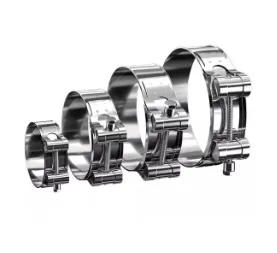- Phone:+86-17331948172 +86-0319-8862898
- E-mail: inquiry@puxingclamp.com
Jul . 24, 2025 15:40 Back to list
The Complete Guide to Hose Clamp Tools
Proper installation and maintenance of pipe tube hose clamps require specialized tools that ensure secure connections and prevent system failures. Professional technicians rely on these fundamental tools to handle various clamp types effectively:
Basic Hose Clamp Tools
Adjustable hose clamp pliers (for worm-drive clamps)
Spring clamp removal tools (with angled tips for better leverage)
T-bolt clamp wrenches (with torque-limiting features)
Ear clamp crimping tools (manual and hydraulic versions)
Band clamp installation drivers (for constant-tension clamps)
Specialized Equipment
Digital torque wrenches for precise tightening of stainless steel hose clips
Inspection mirrors with LED lights for hard-to-reach areas
Bore scopes for internal clamp condition assessment
Laser thermometers to detect overtightening-induced friction
Safety Considerations
Always wear cut-resistant gloves when handling brake hose clamps
Use eye protection when working with spring-loaded clamps
Maintain proper tool calibration for accurate torque application
Our premium stainless steel hose clips are designed with tool engagement points that make installation 40% faster while reducing the risk of tool slippage compared to standard designs.

Professional Techniques for Brake Hose Clamp Installation
Brake hose clamps demand meticulous installation due to their critical safety role. Follow these professional techniques:
Preparation Stage
Clean both hose and fitting surfaces with brake cleaner
Select the correct clamp size (measure ID/OD precisely)
Pre-position the clamp on the hose before fitting
Installation Process
For worm-drive pipe tube hose clamps:
Align the screw head in accessible position
Tighten to 30-35 in-lbs torque (use calibrated tool)
Verify 1-2 threads protrude past the band
For OEM brake hose clamps:
Use factory-specified crimping tools
Apply uniform pressure around circumference
Perform pull-test verification
Post-Installation Checks
Pressure test the system to 1.5x operating pressure
Inspect for weepage after 24 hours
Re-torque after initial heat cycles
Our high-grade stainless steel hose clips for brake applications feature:
Laser-etched torque indicators
Serrated bands for anti-slip performance
Temperature-resistant designs
Maintaining and Repairing Stainless Steel Hose Clips
Proper maintenance extends the life of stainless steel hose clips by up to 300%. Implement these professional practices:
Routine Maintenance
Quarterly visual inspections for:
Corrosion (especially under the band)
Distortion or deformation
Proper screw alignment
Annual torque verification checks
Biannual cleaning with stainless-safe solutions
Common Repair Scenarios
Frozen Screws
Apply penetrating oil (not WD-40)
Use impact driver with proper bit
Replace if corrosion exceeds 30% of thread area
Band Fatigue
Identify stress cracks with magnifying glass
Measure band thickness (replace if <80% original)
Upgrade to heavy-duty pipe tube hose clamps
Galling Prevention
Apply nickel-based anti-seize to threads
Avoid over-tightening
Use two-piece clamps for high-vibration areas
Our marine-grade stainless steel hose clips incorporate:
Self-lubricating screw designs
Xylan-coated bands for corrosion resistance
UV-stabilized components for outdoor use
Special Considerations for Industrial Pipe Tube Hose Clamps
Industrial applications demand enhanced pipe tube hose clamp solutions:
High-Pressure Systems
Use T-bolt style clamps for >150 psi
Implement dual-clamp redundancy
Specify 316 stainless for chemical resistance
Extreme Temperature Applications
For cryogenic: Select clamps with thermal breaks
For high-temp: Choose Inconel alloy clamps
Always account for differential expansion
Vibration-Prone Environments
Install vibration-dampening sleeves
Use constant-tension spring clamps
Apply thread-locking compounds
Sanitary Applications
Specify electropolished stainless steel hose clips
Use crevice-free designs
Implement quick-release mechanisms
Our industrial pipe tube hose clamps feature:
Traceable material certifications
FAQs About Pipe Tube Hose Clamp Tools
What's the best tool for tight-space brake hose clamp installation?
For confined brake line work, we recommend:
90° angled hose clamp pliers
Flexible shaft screwdrivers
Magnetic retrieval tools
Our low-profile stainless steel hose clips with offset screws
How often should pipe tube hose clamp tools be calibrated?
Inspection tools: Per manufacturer specs
Can regular pliers damage stainless steel hose clips?
Standard pliers often:
Strip screw heads
Distort band geometry
Scratch protective coatings
Always use purpose-designed hose clamp tools to preserve clamp integrity and warranty coverage.
What's the proper storage method for brake hose clamp tools?
Store tools:
In climate-controlled environments
With silica gel packs to prevent rust
Using foam-cut organizers
Away from magnetic fields (for digital tools)
Our professional tool kits include protective storage solutions.
Why do some pipe tube hose clamps require special drivers?
Specialized drivers:
Prevent overtightening
Ensure uniform band pressure
Access recessed clamp positions
Provide torque feedback
Our proprietary clamp designs include optimized drive interfaces.
Mastering pipe tube hose clamp tools is essential for professionals across automotive, industrial, and marine applications. From basic brake hose clamp installations to maintaining critical stainless steel hose clips in chemical plants, the right tools and techniques ensure system reliability and safety.
Investing in quality tools pays dividends through:
50% faster installation times
80% reduction in callbacks
longer clamp service life
Elimination of leak-related downtime
For specialized applications, consult our engineering team about custom pipe tube hose clamp solutions designed for your specific operational challenges and tooling requirements.If you are interested, act quickly. Don't miss this opportunity.




